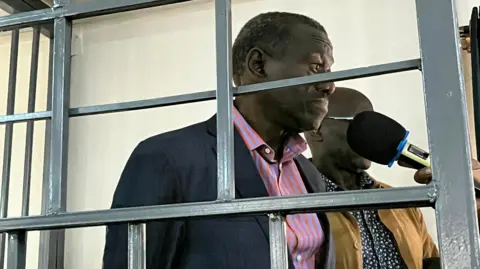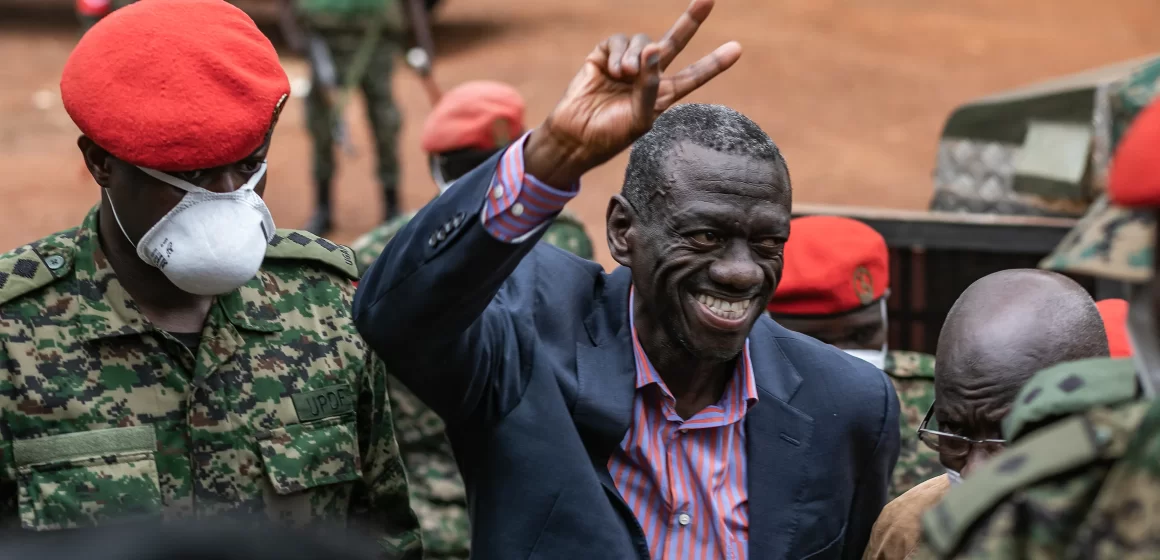|
LISTEN TO THIS THE AFRICANA VOICE ARTICLE NOW
Getting your Trinity Audio player ready...
|
Prominent Ugandan opposition leader Dr. Kizza Besigye appeared before a military court in Kampala on Wednesday, November 20. The former presidential candidate, a relentless critic of President Yoweri Museveni’s long-standing rule, faced charges of illegal possession of firearms and negotiating arms deals abroad—allegations he categorically denied.
Besigye’s arrest has reignited debates about authoritarianism, cross-border justice, and the suppression of dissent in Uganda. His wife, Winnie Byanyima, a globally respected human rights advocate and executive director of UNAids, alleged that Besigye was abducted in Nairobi, Kenya, last Saturday. In a post on X, she claimed her 68-year-old husband was kidnapped during a book launch and forcibly returned to Uganda, where he was held incommunicado in a military detention facility. “He is not a soldier. Why is he being tried in a military court?” Byanyima asked.
The charges against Besigye include allegations of being found with pistols and ammunition in a Nairobi hotel and engaging in arms negotiations in Geneva, Athens, and Nairobi. Despite these accusations, Besigye, flanked by opposition ally Obedi Lutale, maintained his innocence during a court hearing conducted under heavy security. He contested the military court’s jurisdiction, arguing that any legal proceedings against him should take place in a civilian court. His objections were overruled.
The arrest also cast a shadow over Kenya’s role in the affair. The Kenyan government has been under scrutiny for its recent trend of forced deportations, a practice that has alarmed rights groups and tarnished the country’s reputation as a sanctuary for political exiles. The Kenya National Commission on Human Rights condemned Besigye’s alleged abduction, calling it a violation of both national and international law. Meanwhile, the Pan-African Opposition Leaders Solidarity Network decried the incident as a troubling example of how state security forces are weaponized to stifle dissent.

Kenyan officials, however, denied any involvement. Government spokesperson Isaac Mwaura told journalists that he was unaware of Besigye’s arrest, while Foreign Affairs Ministry official Korir Sing’oei said that Besigye’s frequent visits to Kenya were personal. “He is a respected leader with friends and family here. If there is an issue, it should be resolved by Ugandan authorities,” Sing’oei said.
Back in Uganda, the charges against Besigye and Lutale have drawn sharp reactions from opposition leaders and activists. Kampala Mayor Erias Lukwago, a close ally of Besigye, described the situation as “shrouded in mystery” and demanded an official explanation from Kenya. “This is not just a legal issue; it’s a regional concern. Kenya owes us answers,” Lukwago said.
Dr. Besigye’s political career is defined by his resilience in the face of repression. Once President Museveni’s personal physician, Besigye became a fierce opponent of his former ally, accusing him of clinging to power through electoral fraud and authoritarian tactics. Over the years, Besigye has faced repeated arrests, violent crackdowns, and even physical harm, including being pepper-sprayed and shot in the hand during protests. His efforts to challenge Museveni in four presidential elections have been met with allegations of rigging, which the government denies.











LEAVE A COMMENT
You must be logged in to post a comment.